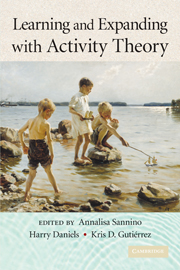Book contents
- Frontmatter
- Contents
- Contributors
- Editors' introduction
- 1 Activity Theory Between Historical Engagement and Future-Making Practice
- PART ONE UNITS OF ANALYSIS
- PART TWO MEDIATION AND DISCOURSE
- PART THREE EXPANSIVE LEARNING AND DEVELOPMENT
- PART FOUR SUBJECTIVITY, AGENCY, AND COMMUNITY
- 12 From the Systemic to the Relational: Relational Agency and Activity Theory
- 13 Expansive Agency in Multi-Activity Collaboration
- 14 The Communicative Construction of Community: Authority and Organizing
- 15 Research Leadership: Productive Research Communities and the Integration of Research Fellows
- PART FIVE INTERVENTIONS
- Bibliography
- Author Index
- Subject Index
12 - From the Systemic to the Relational: Relational Agency and Activity Theory
Published online by Cambridge University Press: 05 June 2012
- Frontmatter
- Contents
- Contributors
- Editors' introduction
- 1 Activity Theory Between Historical Engagement and Future-Making Practice
- PART ONE UNITS OF ANALYSIS
- PART TWO MEDIATION AND DISCOURSE
- PART THREE EXPANSIVE LEARNING AND DEVELOPMENT
- PART FOUR SUBJECTIVITY, AGENCY, AND COMMUNITY
- 12 From the Systemic to the Relational: Relational Agency and Activity Theory
- 13 Expansive Agency in Multi-Activity Collaboration
- 14 The Communicative Construction of Community: Authority and Organizing
- 15 Research Leadership: Productive Research Communities and the Integration of Research Fellows
- PART FIVE INTERVENTIONS
- Bibliography
- Author Index
- Subject Index
Summary
ERODING WORK IDENTITIES
We live in risky times (Beck, 1992; Friedland & Boden, 1994). The boundaries and certainties that shored up systems from nation-states to professional bodies for the past 150 years are dissolving, leaving individuals feeling exposed and unprotected by familiar and historically grounded practices. New forms of work combining real-time face-to-face negotiations with more distributed connections mean that we are linked as individuals perhaps as never before (Giddens, 1991); and the work systems we occupy are perhaps more open, with, as Sennett (1999a) puts it, “febrile” boundaries and mixed work forms. At the same time, the sequential linearity of early modernism, evidenced in narrative structures that give historical coherence to current actions, has been disrupted. For example, people may now need to take into account the narratives of other workgroups as they align their actions across time and space and learn when to interact and when to withdraw.
The workplace is therefore now less likely to be the source of a sustained identity, whether we are victims of short-term contracts (Sennett, 1998), are boundary-breaking creatives (Guile, 2007), or are specialist professionals collaborating on complex tasks (Edwards, 2005). However, as we are propelled forward, sustained more by a sense of our own purposeful agency than by a situated form of professional identity, we are perhaps in danger of revisiting a past that gave rise to the very certainties currently being eroded.
- Type
- Chapter
- Information
- Learning and Expanding with Activity Theory , pp. 197 - 211Publisher: Cambridge University PressPrint publication year: 2009
- 57
- Cited by



